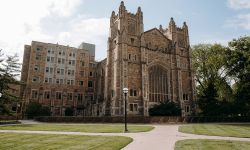Q&A: How Michigan social studies became a ‘pawn in partisan games’

First, conservatives complained about a draft of new social studies standards for Michigan classrooms.
Then, liberals complained about a rewrite of those standards that appeared to favor conservative views.
Now, some conservatives are up in arms again over a third draft of the standards, saying they are back to being too liberal.
The latest round of community meetings across the state begin this week to get public input. You can see the schedule of meetings here.
Five years into the standards update, following 30 community meetings and more than 5,000 submitted comments into the process, Bridge spoke to Venessa Keesler, state deputy superintendent. Excerpts from the interview have been condensed for clarity.
Bridge: When you presented the current draft of social studies standards to the State Board of Education this month, you told the Board that “standards are not about politics.” Why did you say that?
Keesler: I felt it was important to remind the board that this is not what this is about. Standards have been politicized not only in Michigan, but nationally. Now the idea is to de-partisan it as much as possible.
The core of the endeavor is not about pleasing one side or another, but to make sure students have access to high standards.
Bridge: Why has this taken five years?
Keesler: We had a draft in 2015 that had 95 percent approval. That was when (then Sen. Patrick) Colbeck (R-Canton Township) wrote a very passionate letter about what was wrong with the standards. (Then-)Superintendent Brian Whiston felt if there was this voice on the right saying this is bad, it was right to go back and include everyone under the tent – when they were happy, we would move forward. What he didn’t anticipate was making them happy would make so many of the 95 percent who were happy with the standards unhappy.
Bridge: So the standards have been tweaked again, and now conservatives are unhappy again.
Keesler: It is a sense of whiplash. I don’t think the first set (proposed to the State Board of Education in 2015) was biased. Then we were influenced by certain voices too much and now we need to swing them back to the middle as much as possible.
Bridge: Were you surprised by the reaction to the release of this draft?
Keesler: We were under no illusions that this was a draft that would be (universally) popular. That’s good, we want a good discourse around these issues.
My big thing is, I want people to actually read the standards themselves, not just read what people write about the standards and react to that. Whether we get these things right is an important discussion. But we want people to base their opinions on what is actually in the standards.
Bridge: Michael Warren, an Oakland County Circuit Court judge and a former Republican member of the State Board of Education, wrote a letter to (Interim) State Superintendent Sheila Alles blasting the current draft, saying it is “highlighting the progressive movement and censoring the conservative movement.” Does he have a point?
Keesler: Things named at the standard level … are not specific. This allows for the professionalism of teachers in their own communities (to create lesson plans tailored to what they want their students to learn). That is the point of local control - local communities can decide how they interact with education.
Bridge: Last year, your department received a lot of criticism for a draft of social studies standards that some felt swayed too far to the political right. Now it’s conservatives saying the standards are swayed too far to the political left. Do you feel you will be blamed by one side or the other no matter what you do?
Keesler: When we go into developing standards, we don’t go in and say, ‘How many Democrats and how many Republicans do we have (in the room),’ we ask, ‘Who are the experts in social studies? They (social studies committee members) are doing it as educators, not as partisan voters.
You don’t get to 100-percent consensus on something in a state this size. It’s our responsibility to make tough choices sometimes. And then there’s local control so local communities can decide how things are implemented.
We’re hoping not to make this another pawn in partisan games.
We’ve seen that so many times in the past few years. This can just be about our students. Let’s try to do this together.
Michigan Education Watch
Michigan Education Watch is made possible by generous financial support from:
Subscribe to Michigan Education Watch
See what new members are saying about why they donated to Bridge Michigan:
- “In order for this information to be accurate and unbiased it must be underwritten by its readers, not by special interests.” - Larry S.
- “Not many other media sources report on the topics Bridge does.” - Susan B.
- “Your journalism is outstanding and rare these days.” - Mark S.
If you want to ensure the future of nonpartisan, nonprofit Michigan journalism, please become a member today. You, too, will be asked why you donated and maybe we'll feature your quote next time!






